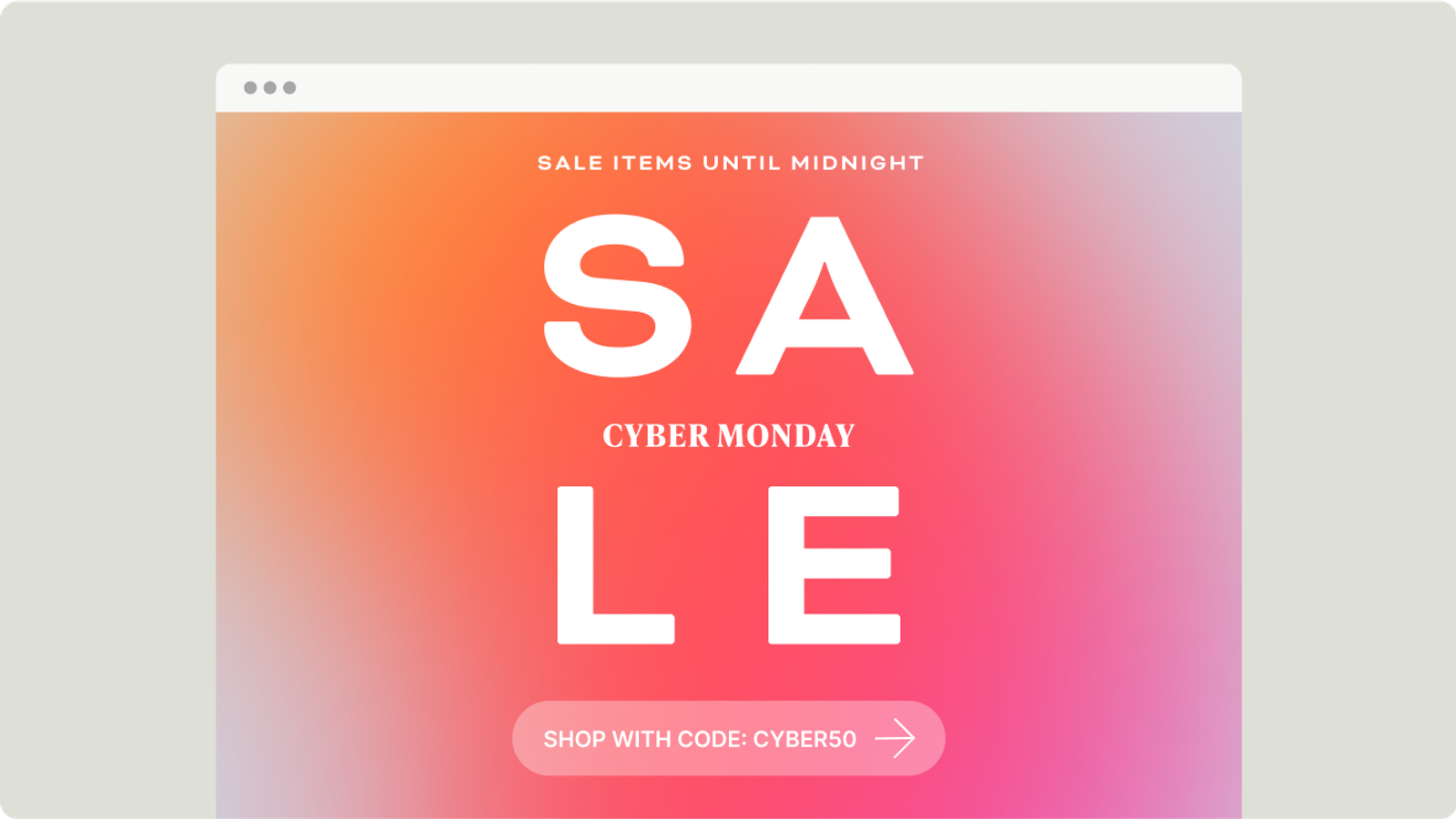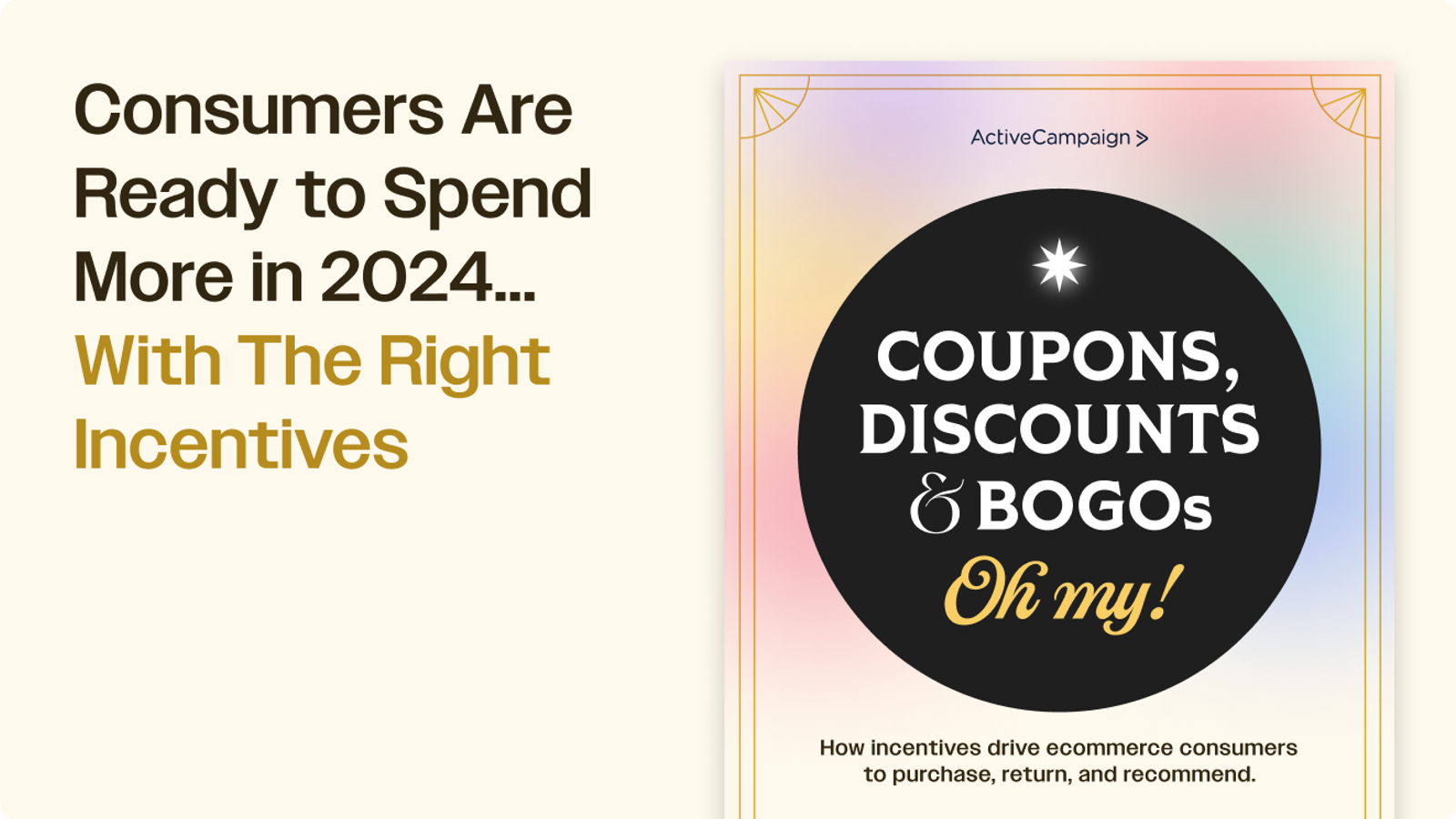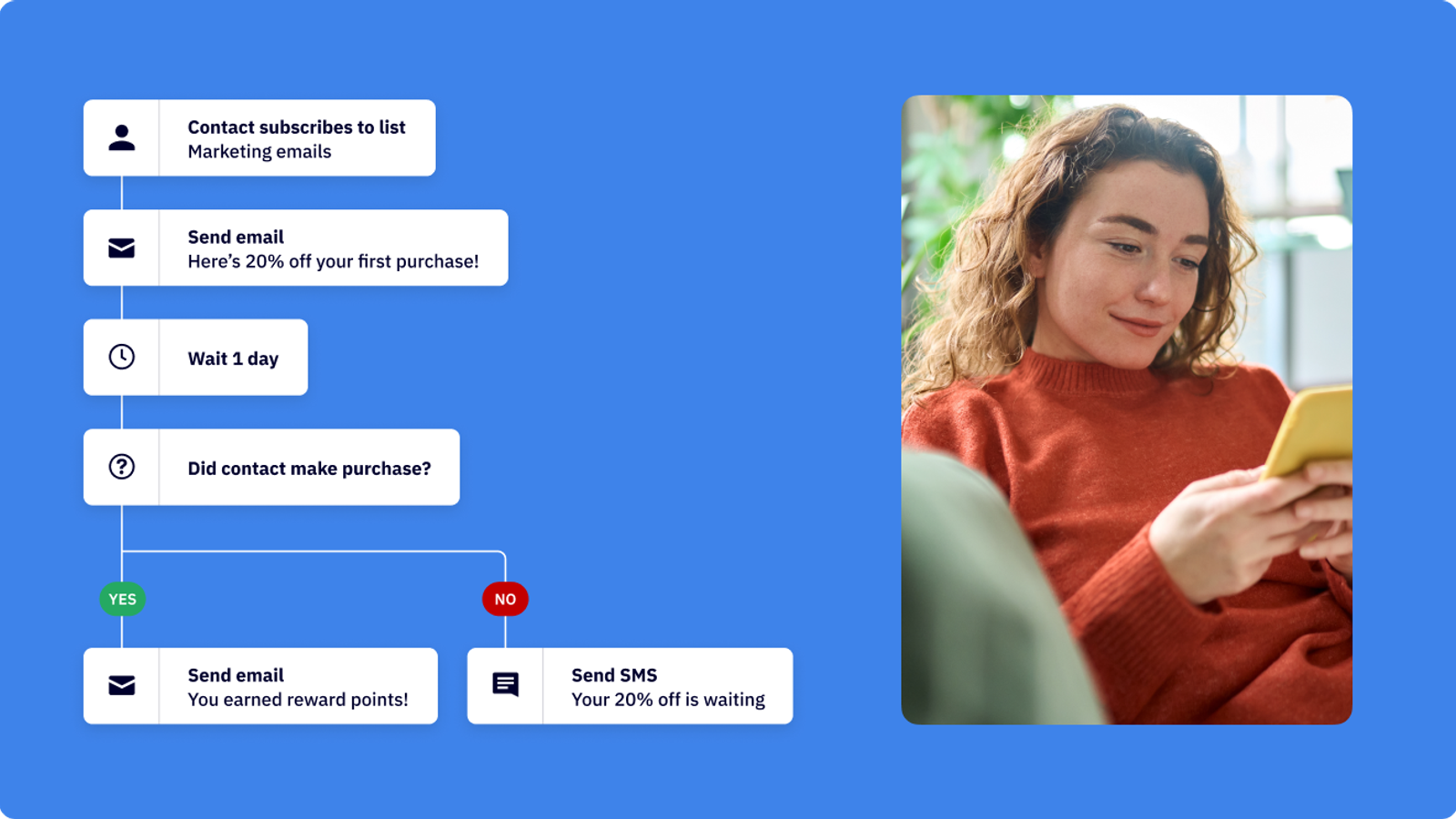In the world of online retail, savvy store owners recognize the unmatched power of e-commerce email marketing. It's not just about sending emails; it's about the incredible ROI it brings without breaking the bank. The magic lies in its scalability, allowing you to save on resources, from time to customer acquisition costs.
Running an online store means constantly seeking potent strategies that truly deliver. Pairing a well-crafted content marketing plan for e-commerce with a meticulously planned email calendar is a powerful combo. But, at the heart of it all? Understanding your potential customer. Knowing who you're contacting and tailoring your messages with their interests in mind can elevate the customer experience.
In this blog post, you'll uncover the essentials to shape your e-commerce email marketing approach and drive tangible results for your brand.
Email marketing is more than crafting compelling subject lines and sending out messages—it's a targeted communication strategy that allows businesses to connect with their audience via email directly. How does it work? Companies build email lists that form their contact base and use them for promotional messages and essential transactional emails. These lists contain the email addresses of potential customers who've voluntarily subscribed, perhaps through a landing page. Once they've opted in, the company initiates a series of promotional emails underpinned by the art of lead nurturing. This technique masterfully guides these contacts down the sales funnel, transforming them from subscribers to loyal customers.
The power of e‑commerce email marketing
Email marketing stands out for its adaptability in the realm of e-commerce. It offers the unique ability to tailor communications precisely for your email subscribers, ensuring each message resonates with them. While the emails might be sent in bulk, the experience for the recipient feels individualized and personal. Some might dismiss email marketing as a relic from the past, but they couldn't be more mistaken. A staggering 86% of marketers view it as either "important" or "very important."
E-commerce email campaigns can profoundly influence three critical business areas: lead nurturing, relationship-building, and after-sales care. Intrigued about their impact?
Discover more about e-commerce marketing and how it can revolutionize your online retailer endeavors.
Lead nurturing
Lead nurturing isn't just about pushing a sale. It's about crafting a memorable and satisfying journey for potential customers. Remember, nurturing through methods like an engaging email newsletter is pivotal in converting qualified leads into dedicated customers. Leveraging finely-tuned e-commerce marketing automation software with spot-on, personalized content can be the game-changer, guiding your email subscribers toward that final purchase.
Building relationships

While lead nurturing paves the way for forming relationships, it's crucial to cherish those who've already made a purchase. In e-commerce email marketing, the goal isn't just to make a sale but to foster enduring connections. Your strategy should spotlight opportunities to keep these customers engaged, perhaps with an enticing discount code, ensuring they continue frequenting your online store. It's all about laying the bricks for a foundation of loyalists who'll stand by your brand.
After the sale
So, the deal's sealed. It's time to move on to the next types of emails and the next customer, right? Think again! This post-purchase phase is golden for cementing customer loyalty. Keep the conversation alive. Employ automated cart email follow-up messages, mail them personalized e-commerce packaging for a memorable touchpoint, tempt them with related or complementary product lines to encourage cross-selling, and always—always—solicit feedback. These post-sale practices aren't just beneficial for your e-commerce sales; they're a win-win, enhancing your brand's reputation and customer experience.
Crafting your e‑commerce email campaign blueprint
Understanding the essence of an email marketing strategy and its pivotal role for businesses lays the foundation. But how do you translate this knowledge into tangible actions for your e-commerce venture? Here's where we zoom into the nitty-gritty of actual execution. To develop an effective campaign plan, focus on three keystones: pinpointing your target audience, setting clear objectives, and determining measurable success indicators. Let's embark on this step-by-step guide for tailoring an e-commerce email marketing campaign.
Dive deep into your audience
Your premier task in chalking out a stellar email campaign? A profound comprehension of your audience. These aren't just "recipients" or "potential customers." They're real people with distinct habits, desires, and inclinations. The key? Delve deep into their psyche, tap into their behaviors, and gauge their preferences. Armed with these insights, your campaign can morph into a dynamic tool, pulsating with data-driven decisions and adaptive strategies. A quintessential example is how ActiveCampaign plays the game. With its robust segmentation and dynamic content features, ActiveCampaign empowers you to dispatch tailored emails to individual email addresses, ensuring the delivery of the most pertinent content precisely when and where it's needed the most.
Set crystal-clear objectives
Direction is everything. What do you hope to achieve with your email campaign? Broaden your reach? Drive sales? Foster a more intimate bond with your subscribers? It's pivotal to outline these aspirations lucidly, whether they revolve around driving sales or offering special discounts to boost engagement. Once these questions have distinct answers, curating an email sequence of resonant content becomes effortless. With clarity in objectives, you're in a prime position to serve sublime experiences to those most inclined to patronize your offerings.
Pinpoint success benchmarks
Concluding the planning phase requires you to sculpt the outcomes you aspire for—essentially, pinpointing your KPIs (Key Performance Indicators). In simpler terms, KPIs are your compass, guiding you to gauge the potency of your strategies or a bouquet of endeavors nested within your grand scheme. A few timeless KPIs, paramount for any enterprise, include the Customer Acquisition Cost (CAC), conversion percentage (or success rate), and the ever-pivotal Net Promoter Score (NPS). Therefore, restrict the milestones you aim to reach and enlist the metrics and KPIs to serve as your success yardstick.
Types of email marketing for e‑commerce

With the stage set for your campaign's grand debut, it's time to roll up your sleeves and immerse yourself in action. Two golden rules to steer by: prioritize tailoring content to the individual and dispatch your emails at peak moments of receptivity. How can you achieve such a seamless touch on a broad scale to boost your email click-through rates?
Enter ActiveCampaign. As you focus on email subscriber list growth, harness its power to dispatch varied messages to diverse recipients through the intelligent amalgamation of tags and dynamic content. This ensures every potential customer gets content that resonates and is precisely tailored to their position in the sales funnel.
But what's content personalization without assured delivery? It's essential that the crafted messages reach the inbox of your audience. You're in secure hands with ActiveCampaign leading the charge in email deliverability. Boasting features such as predictive sending, campaign sneak-peeks, spam checks, and domain authentication, we rigorously assess deliverability, guaranteeing your emails reach their intended destination.
Yet, beneath all these layers, and with an eye on maximizing the return on email marketing investment, lies the heart of the matter: strategic intent. To supercharge your e-commerce email marketing strategy, why not draw inspiration from some exemplary templates to craft the perfect blueprint for your venture? Let's dive in!
1. The welcome sequence
When someone enters your digital abode, the welcome sequence acts as the perfect doormat, ushering them in. Remember, these newcomers eagerly subscribed to your content—they're genuinely interested. So, why not seize this golden window of engagement? Introduce them to a special offer, give them a glimpse of your products, ask for their initial impressions, or perhaps present a sneak peek of your bestsellers—the world's your oyster here. The bottom line is not letting this prime moment slip by without capitalizing on their heightened engagement and driving e-commerce sales. Dive into ActiveCampaign, set your welcome automation into motion, and watch the magic unfold.
2. Abandoned cart
Let's talk about a crucial rescue mission—salvaging abandoned carts. E-commerce email marketing geared towards cart abandonment is your knight in shining armor to recoup potential lost sales. Why, you ask? Firstly, it gives you a shot at winning back a significant chunk of these nearly-missed sales. Moreover, this isn't a manual, time-consuming task. A well-structured flow does the trick. Once set, it autonomously springs into action based on the triggers you've defined. The result? Email marketing swoops in to rescue those shoppers who got sidetracked or had a last-minute change of heart, channeling previously unclaimed revenue right back into your coffers.
3. Repeat shoppers
If you're a regular on our blog, you're no stranger to this golden nugget: Retaining customers is far more economical than wooing new ones. Did you know that your recurring shoppers tend to spend a whopping 120% more annually?
Sounds like a well of opportunity.
Continuous engagement is paramount to ensure they remain loyal customers. An ace up the e-commerce email sleeve? The art of cross-selling. Gauge their past experiences—if they've been positive, you've set the stage. It's time to slide in with product recommendations that complement their previous purchases beautifully. Dive into the world of personalized email suggestions and watch those repeat sales soar.
4. Reigniting the flame: re-engagement
Within the vast sea of your customer base, there are those who once were avid patrons but now seem distant. They're like old friends who've lost touch. They often need a gentle nudge or a fond reminiscence to rekindle that connection.
Craft an automation, based on their last interaction, to give that nudge. The key? Keep it brief. They're already familiar with your brand, so there's no need to overload their inbox with a full-blown introduction. A simple, evocative reminder can steer them towards the desired action, reigniting their interest.
5. The continual courtship: after-sales

As previously highlighted, bidding farewell post-purchase is a missed opportunity. Think of after-sales as the ongoing courtship phase in a budding relationship. Seek feedback—it's a double-edged sword that offers invaluable insights for improvements and keeps the communication lines buzzing. Nurturing this post-purchase bond reaps manifold dividends: slashed acquisition costs, ramped up engagement, and potentially, amplified sales. Also, if cross-selling aligns with your objectives, this phase provides fertile grounds to subtly introduce complementary offerings. In e-commerce email marketing, the journey doesn't end at the checkout—it only begins anew.
The unyielding power of email: crunching the numbers
Considering the importance of email open rates, it's easy to understand why businesses shouldn't get swept away by newer, shinier communication platforms. But if you take a step back and consider the numbers, you'll find that email holds its ground. The figures don't lie: as per Statista's insights, a staggering 4.14 billion people used email in 2021. This marked an impressive leap of 110 million from the previous year.
And the trajectory only seems to be ascending. Projections indicate that by 2025, this number will swell to a jaw-dropping 4.59 billion daily email users. To further underscore the omnipresence of this channel, did you know that globally, over 306 billion emails are zipped across the digital realm each day? Another statistic from a 2020 Optinmonster survey revealed that 99% of individuals peek into their email inbox daily.
Ponder this for a moment: the email market, currently valued at a cool $7.5 billion, is set to catapult past the $10 billion mark, potentially touching a sky-high $17.9 billion by 2027.
Craving more such compelling figures? Dive into our dedicated article, "10 Email Marketing Stats to Help Your Business Grow!" For those aiming to benchmark their efforts, our email marketing benchmarks guide could be your golden ticket!
The rationale behind e‑commerce email marketing
As the digital landscape evolves, and considering the significance of email open rates, businesses might often wonder: Why stick to email marketing? To dispel any reservations, let's delve into some of the most compelling reasons why investing in email marketing, especially for e-commerce, is a wise decision.
Affordable outreach
Costs can quickly escalate in the world of marketing. But email marketing stands out as an economically sound option. Unlike traditional marketing avenues that can burn a hole in your pocket, email marketing champions a more cost-effective approach. It's rooted in the principles of inbound marketing—a strategy that's less intrusive and wholly based on the audience's consent. Think about it: every individual on your email list has actively chosen to receive communications from you. They've signaled their interest by filling out a form, meaning your messages are landing in the inboxes of those genuinely interested in your offerings. This direct line of communication with a pre-interested audience amplifies the chances of conversions and optimizes email click-through rates, ensuring you get more bang for your buck.
Championing content-led interactions
Email marketing flips the traditional marketing script. Instead of bombarding the audience with unsolicited messages, you become the content creator. The invasive adverts that break one's content consumption rhythm? They're absent here. In email marketing, your brand's content takes center stage. Your audience doesn't see you as an interruption but as the main event.
This pivotal shift means you're no longer chasing after potential customers; instead, they seek you out. Leveraging this dynamic, you can craft strategies that cater to specific audience segments. You can tailor your content by discerning where a potential customer is on their buying journey. Those at the onset might benefit from informative pieces that nurture their interest, while those on the verge of purchasing might be more receptive to enticing offers. The goal is clear: cater to your audience with precision, boost your e-commerce sales, and watch your revenue streams flourish.
Unveiling the benefits of e‑commerce email marketing
To truly harness the potential of email marketing in the e-commerce sector, it's vital to understand its intrinsic benefits. Here's a closer look:
Precise ROI measurement
One standout advantage contributing to email subscriber list growth is the measurable nature of email marketing. The strategy is replete with data points and metrics, allowing businesses to gauge their campaign's efficacy with precision. With the myriad of available metrics—from open rates to click-through rates to conversion rates—you can glean insights into customer behavior, preferences, and engagement levels. Such data-driven insights provide a roadmap for future strategies, ensuring your email marketing endeavors are continuously refined and optimized. The capability to interconnect various data sets means you're always in the know, understanding not just who your audience is but also their intrinsic habits and preferences.
Foster a loyal customer base

Building connections is at the heart of successful marketing. And what better way than through email, which facilitates a personalized connection with each subscriber? Through tailored email campaigns, businesses can communicate that every subscriber isn't just a number but a valued individual. This personalized touch fosters a sense of belonging, making subscribers feel part of an exclusive club. Such sentiment is the cornerstone of customer loyalty. With targeted offers, early access to sales, or exclusive content, you can entice customers to make a one-time purchase and repeatedly engage with your brand.
And there's more. When you synergize email marketing with a robust CRM platform, you don't just retain customers—you transform them into brand advocates. These individuals patronize your products or services and actively promote them, amplifying your brand's reach and credibility. And what's the cherry on top? The best e-commerce platforms bring the dual magic of email marketing and CRM, ensuring that your e-commerce venture is always ahead of the curve.
Mastering e‑commerce email marketing: pro tips
Dive into these expert-backed strategies to ensure that your email marketing game remains strong in the competitive e-commerce landscape:
1. Segment your list
The art of segmentation cannot be emphasized enough. Begin by categorizing your audience based on the sales funnel stages they align with. Consider the diverse spectrum of your audience—from novices discovering your brand for the first time to long-standing loyalists. The content requirements for these distinct groups differ dramatically. Beginners might benefit from introductory content, while seasoned subscribers would appreciate content that resonates with their deep-rooted familiarity with your brand. Crafting tailored content ensures enhanced engagement and strengthens brand affinity, making subscribers feel cherished and acknowledged.
2. Adopt the right tone
Language is the bridge connecting brands with consumers. To ensure that this bridge stands strong, it's vital to employ a tone that resonates with your target audience. This entails molding your message according to the preferences and expectations of your persona. For e-commerce brands, striking a chord that stimulates purchase intent, all while informing about a sale or a special offer, is pivotal. And amidst this, clarity and brevity are your best allies. Ditch jargon and opt for clear, concise, and impactful messaging.
3. Secure permission & boost subscriptions
Treading the ethical path in email marketing is non-negotiable. Before flooding inboxes, seek the explicit permission of your recipients. With regulations like the General Data Protection Law (LGPD) in place, obtaining unequivocal consent for data utilization and its purpose is paramount. But how do you augment your subscriber base? E-commerce platforms have a secret weapon: the power of pop-ups and lead-capture forms. Sprinkle these strategically across your site, ensuring they're noticeable yet non-intrusive, and watch your list grow exponentially.
4. Personalize your messages
Remember, you're conversing with real individuals, each with their own preferences, histories, and quirks. Ensure your messages reflect that by infusing a touch of personalization. Addressing your subscribers by their names, referring to their past interactions, or catering to their preferences can evoke a sense of individual attention. This helps bridge the distance between the brand and its audience and amplifies the potential of securing a purchase.
5. Recover abandoned carts

E-commerce platforms often grapple with the challenge of cart abandonments. However, email marketing offers a strategic solution. Platforms like ActiveCampaign empower brands to initiate targeted communications for those who've added products to their carts but have yet to purchase. These strategically timed reminders can significantly mitigate the chances of potential sales slipping away.
6. Run targeted promotions
The power of specificity can’t be overlooked. Tailored promotions targeted at specific segments of your audience can yield exceptional results. Consider rolling out exclusive discounts to fresh newsletter subscribers. Alternatively, celebrate the loyalty of longstanding subscribers with special offers or unique perks. ActiveCampaign's robust analytics ensure you wield the insights to discern when and which type of promotion to unfurl.
7. Measure results
The efficacy of your email marketing efforts isn't nebulous; it can be quantified. Regularly review your campaigns' performance metrics to ascertain their impact. Are they resonating as intended? Are they driving desired actions? Tools that enable A/B testing can be game-changers here. You can glean actionable insights by contrasting different elements like send times, email subjects, visual elements, or content tones. This data-driven approach ensures you continually refine your strategies for optimal performance, translating to enhanced sales for your e-commerce enterprise.
Elevate your e‑commerce email strategy with ActiveCampaign!
At the intersection of innovation and user-friendly interface lies ActiveCampaign—a tool that's transformed email marketing for over 175,000 businesses globally. Our success stories are testimonies of brands achieving exponential growth, crafting personalized customer experiences, boosting sales conversion rates, and witnessing genuine engagement.
Why choose ActiveCampaign for your e-commerce platform?
- Rich Ecosystem of Integrations: Our platform boasts over 930 integrations. This includes seamless compatibility with industry leaders like VTEX, Shopify, WooCommerce, and numerous others. By synchronizing your store and integrating with the e-commerce checkout process through our advanced automation mechanisms, you pave the way for more innovative, revenue-boosting strategies.
- Comprehensive Marketing Suite: Far more than just an email marketing tool, ActiveCampaign is your holistic marketing automation and sales CRM solution. Benefit from features tailored for e-commerce success: abandoned cart reminders, dynamic product catalogs, targeted cross-sell email automations, advanced segmentations, and more.
- User-Centric Approach: Our platform is meticulously designed to be intuitive and accessible. Regardless of your tech proficiency, you can start dispatching impactful email campaigns in mere clicks with ActiveCampaign.
Email marketing FAQ
How can I measure email deliverability?
To measure the deliverability of your emails, use a robust email marketing software for your e-commerce business like ActiveCampaign. With ActiveCampaign, you can craft newsletters and evaluate your email campaign performance, differentiating your brand and gaining insights into essential metrics. This includes the open rate, click-through rate, read duration, inbox arrival times, counts of contacts categorizing emails as primary, spam complaint frequency, and more.
How do I determine my email recipients?

Deciding the recipients for your e-commerce email marketing endeavors hinges on effective lead acquisition and strategic segmentation. Purchasing a list of contacts is highly discouraged, as such approaches often rank amongst the poorest email marketing strategies. It's paramount to have explicit permission to dispatch emails. Additionally, addressing potential e-commerce return rates by emphasizing lead qualification is crucial, ensuring that your communications align with the expectations of various customer segments within your e-commerce.
Why should I engage a company for email marketing?
If your enterprise's core competency isn't communications, you're presented with two avenues: either engage an external agency for your campaigns or establish an in-house team dedicated to curating them. Whichever route you opt for, and while considering the impact of e-commerce customer reviews, there's undeniable value in leveraging a marketing automation solution like ActiveCampaign. Such systems streamline monotonous tasks, enabling you to zero in on core objectives. Plus, they facilitate extensive data gathering, empowering you to intimately understand your audience and base your strategies on tangible, real-world statistics. By marrying this potent tool with an efficient CRM system, you're poised to redefine your customer engagement paradigm. This results in superior content delivery and an unparalleled service experience for your clientele.
Planning your marketing campaigns ahead of time? Click here to download our free e-commerce calendar to help you prepare for the holidays and events that matter to your brand.
Conclusion
E-commerce email marketing isn't just a tool—it's a transformative strategy that amplifies your online store's potential. It provides an efficient bridge, linking businesses to potential and existing customers. What makes this strategy exceptionally compelling is its cost-effectiveness and the simplicity of crafting impactful automations that yield remarkable returns with modest outlay.
With ActiveCampaign at your side, you're not navigating these waters alone. You can access over 500 meticulously designed automation recipes, ensuring you're always equipped with the right approach for any situation. So, between understanding e-commerce payment gateways and other intricacies, instead of getting bogged down with the complexities, you can channel your energy towards what truly counts—cultivating meaningful relationships with your customers and scaling your business to new heights.







